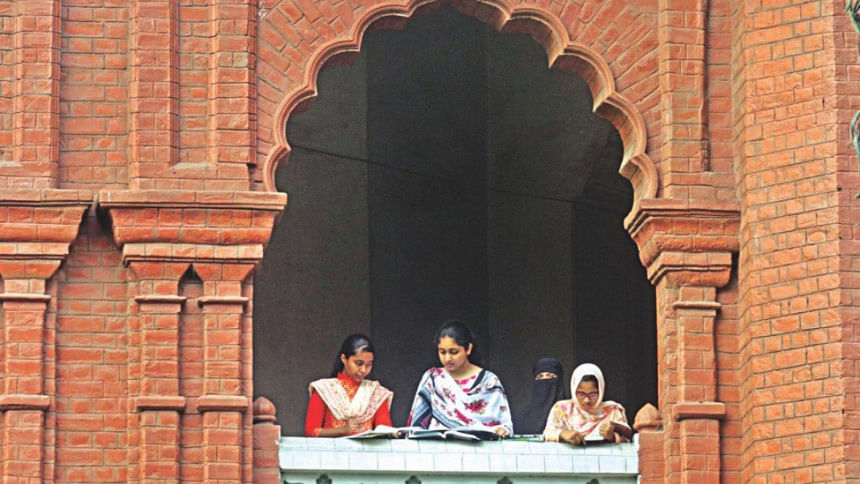Dhaka University’s ‘nervous nineties’

The University of Dhaka has achieved a lot in these 98 years, and it has played a pivotal role in structuring the country's economy, politics, society and development. Through the many scholars it has given birth to, the university has made inspiring strides in different fields and has taken academics substantially further from the point it was at almost a century ago.
Yes, we have a lot of successes to celebrate, and I know the celebrations will commence with full power as we reach our 100-year mark soon. Yes, we are very proud. But at the same time, I want to be among the ones thinking ahead—wondering what our achievements should be in the next 98 years and what we have failed to achieve in this century.
While I know that it's important for Dhaka University to increase its quality through teachers engaging in more research, and try to improve its ranking, my first and foremost wish for my university is that it tries harder for its students. By trying harder for its students, I mean for this university to play a pioneering role in bringing back students' love for learning, their zeal for making a difference, their will of dreaming bigger dreams. I want my university to lead the revolution against our education system being a "one-size-fits-all" system. I want us teachers to be able to promote creativity and originality in class—to be able to teach our students to think and not just memorise, to learn and not just attain high CGPAs. And for that to be possible, we need a massive reform in our pedagogy, in our class sizes, in our question patterns, and mainly in our approaches. Getting a job—a "good" job, with a good salary and good social status—will always be a priority for students. But I want Dhaka University to be a platform that will help students find a purpose behind their chase—to help students actually want to chase their dreams, and to dare to dream in the first place. Just as Dhaka University has led monumental movements that have shaped this country's history, it is time for it to lead the revolution of putting an end to the "rat race" our students and teachers are running—a race they are somewhat forced to run.
While I strongly believe that pedagogy is one area in which we need reform, the other area we need to rethink is whether politics—specifically party-based politics—is doing more harm than good and whether the quality of education in our institution is paying the price for it.
What I want from Dhaka University in the upcoming decade is that it improves the living conditions for students who stay in the halls on campus. Yes, there are resource and budget constraints, but our first priority should be allocating our resources for the betterment of our students. I want our university to become more inclusive, for it to be as comfortable for a disabled student as for the rest of us. I believe the glory of our university was built, in large part, on the backs of students in different hardships breaking through barriers to find their own place in the scheme of things: the son of a poverty-stricken rickshaw-puller spending night after night in the library to come first in his class, or the daughter of a farmer taking up three extra tuitions to afford costs of living and study in the capital. I want our university to retain this glory and to encourage students from all walks of life to shatter the barriers in their paths.
Education should not be a one-size-fits-all system; we should not expect every boy or girl to aim for BCS and excel. Somehow, we must figure out how to create, foster and sustain an education system that will once again create honest, kind-hearted, knowledgeable and wise dreamers and leaders. I want the University of Dhaka to take the lead on this. I would expect nothing less. We need to play a pivotal role in addressing mental health issues too—to make sure the student suicide rates decrease and do not keep increasing like they are.
So, what do I want from Dhaka University in the next 98 years? I want it to give us the platform to ask questions—to question the norms and to thrive to challenge the existing standards. As a Dhaka University teacher, I want to be able to ask how we can tailor our education for every single student. I want to think about students' voices being heard and them being seen as human beings, not just CGPAs in Excel spreadsheets.
While I strongly believe that pedagogy is one area in which we need reform, the other area we need to rethink is whether politics—specifically party-based politics—is doing more harm than good and whether the quality of education in our institution is paying the price for it. Politics will probably always be a part of our system—whether we want it or not. That's well and fine. My trouble, especially as a new teacher, is with such politics playing the dominant role that it does in our academic institution.
Student politics and teacher politics have always been an intricate part of the framework of Dhaka University and politics is an essential tool of course, but only when it is used for the greater good. I wonder, and I invite anyone reading this to ponder, whether our university politics still upholds the glorifying status that it once did. For our students who are involved in party politics, how is it working out for them? Is party politics complementary to the ethics we try to instil in our students and the lessons we want to teach them? Or does it directly contradict our aspirations to build the dreamers of tomorrow? Do you worry about the answers you would hear if you asked students and teachers what would come first in terms of priority: party or institution? Party or student welfare? Party or country? I do.
So, the question stands: do we need to rethink the role of politics in our academic institutions? When a hundred years go by again, and we are at the point of celebrating the university's 200th anniversary, will we regret not intervening for the sake of our students, their welfare and for the quality of the education we are giving them?
To me, university life, especially at the University of Dhaka, as a student and as a teacher revolves around the three Ps: porashona, prem and, of course, politics. We can each have our different interpretations of these: for some prem in university life has meant finding the person they ended up spending their life with, while for some it meant love for the campus, for an ideology, for sports, for teaching or for learning. Anyone who's been a part of this university has experienced at least one of the Ps in their life. While I believe that the prem part is something that will live on forever, it is high time we rethink the porashona and politics part of it all.
It all comes down to asking ourselves: what do we want from Dhaka University? As a teacher, an equally important question for me is: what does Dhaka University want from me? Does it want me to think outside the box, to be passionate in striving for change? Or is that more difficult than helpful?
There was a time when I used to think of the answer to this question and feel confused. But now, it takes me back to the memory of sitting in the common room of my department one afternoon with two of my teachers—both well-known for questioning the wrong and supporting the right despite the consequences for themselves. I remember, and will always cherish, one of them looking me in the eyes and telling me that he expects more from me than just accepting everything as it is. He told me to be wary of the chaos all around, but to not be afraid to set my own rules of what is right and what is wrong. He said, "Set your own standards" and till this day, it is that phrase of confidence that keeps my dreams alive that someday, the University of Dhaka will step into higher realms of achievement. All because there are still people who believe in it and fight for it despite the struggles they personally face for their choices.
Rubaiya Murshed is a lecturer at the Department of Economics, University of Dhaka.
Follow The Daily Star Opinion on Facebook for the latest opinions, commentaries and analyses by experts and professionals.
To contribute your article or letter to The Daily Star Opinion, see our guidelines for submission.

 For all latest news, follow The Daily Star's Google News channel.
For all latest news, follow The Daily Star's Google News channel. 



Comments